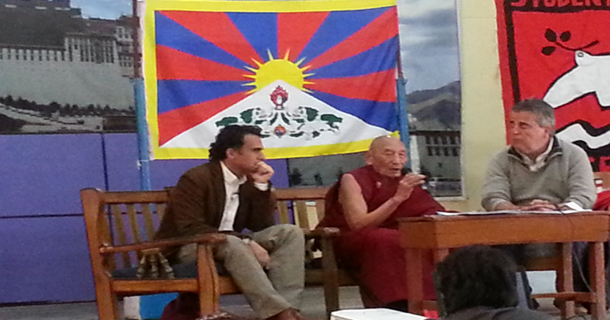Two prominent Spanish Human Rights activists brought their campaign for justice on behalf of Tibet to Dharamshala. Exiled Tibetans and Tibet supporters come together at for a talk by Alan Cantos, Director of the Comite de Apoyo al Tibet (Spanish Tibet Support Committee) and human rights lawyer Jose Elias Esteve Molto. The talk detailed their ongoing fight to bring to justice five high-profile Chinese leaders for crimes against humanity in Tibet. The leaders include former President and Party Committee Secretary of the Tibet Autonomous Region Hu Jintao, former President Jiang Zemin and former Prime Minister Li Peng.
At the talk, supporters wore masks of these leaders and knelt before the audience as if on trial. Mr Cantos and Mr Esteve expressed their unwavering support for the Tibetan people, especially the political prisoners at the heart of their case, and emphasised the need for European countries to stand against China or face having the principles of their democracies eroded.
For fifteen years, Mr Cantos and Mr Esteve have been using the principle of universal jurisdiction, which allows perpetrators of serious crimes to be prosecuted in another state, to attempt to try the Chinese leaders in the Spanish courts on charges of genocide, torture and crimes against humanity committed in Tibet.This was necessary in part because China does not recognise the International Criminal Court.
The duo spoke of the many setbacks they have faced, most recently the Spanish Parliament’s controversial decision to amend the principle of universal jurisdiction, which –if upheld on appeal – would make it impossible to pursue the case in Spain. This decision came after a seeming victory: in late 2013, Hu Jintao had been indicted and orders of arrest had also been issued for Jiang Zemin and Li Peng. China, however, responded by putting intense pressure on the Spanish ambassador and a Chinese delegation was dispatched to Madrid to demand an end to the court proceedings. Mr Esteve went on to say that Zhu Weiqun, President of Chinese Religious and Ethnic Affairs in China, declared at this time in reference to the Spanish judges: “let them go ahead if they dare.”By February 2014, the Spanish Parliament had voted to allow universal jurisdiction to be used only in cases involving Spanish nationals. This led Mr Esteve to comment that the Spanish government “has not hesitated to lay [their] democracy at the feet of China.”
Mr Esteve’s comment echoed the earlier assertion of Mr Cantos that, should any European country ignore the plight of Tibet in favour of doing business with an economically powerful China, they risk eroding the foundations of their democracy. He said that “what we are trying to do is, symbolically or not symbolically, say ‘no’ to China…no justice, no business.”He went on to say that “Tibet is the tip of a huge iceberg of…submission of democratic countries and their principles. Tibet represents the failure of modern democracies to stand up for their principles. So it’s not only Tibet that loses, we all lose by not learning to say ‘no’ to China.”Mr Cantos also emphasised the need for a programme of truth and reconciliation in Tibet, citing the ongoing problems in Spain as a result of the lack of such a programme after the Spanish Civil War.
Mr Esteve closed by saying that his and Mr Cantos’ work is driven and inspired by Tibet’s political prisoners. He welcomed Ven Palden Gyatso, imprisoned for 30 years by the Chinese authorities and a key witness in the case, to the stage to give his own account of his experiences over the fifteen years of the case. Mr Esteve also named Tanak Jigme Sangpo and the Drapchi nuns amongst others, and said of all the political prisoners:“our work is dedicated to them and their example of courage. It’s actually for all the Tibetan people and we will never give up”.
The event was organised by Students for a Free Tibet and the India and International Tibet Network. It took place at Tibetan Children’s Village Day School in McLeod Ganj on February 14.





 Print
Print Email
Email